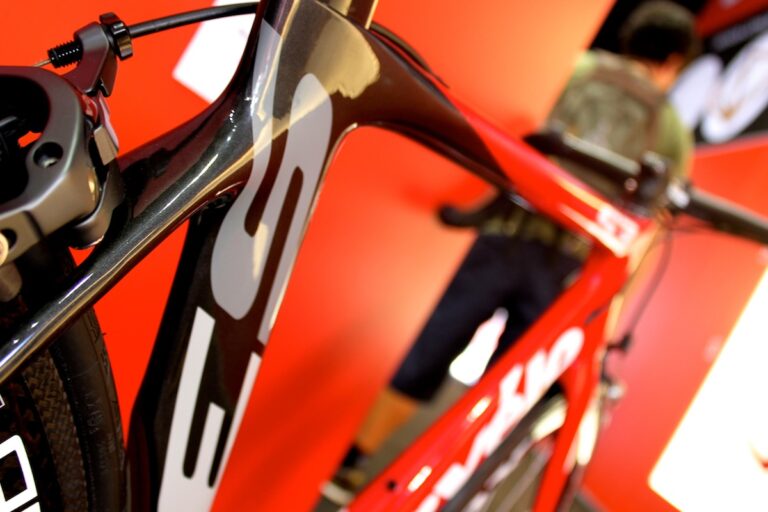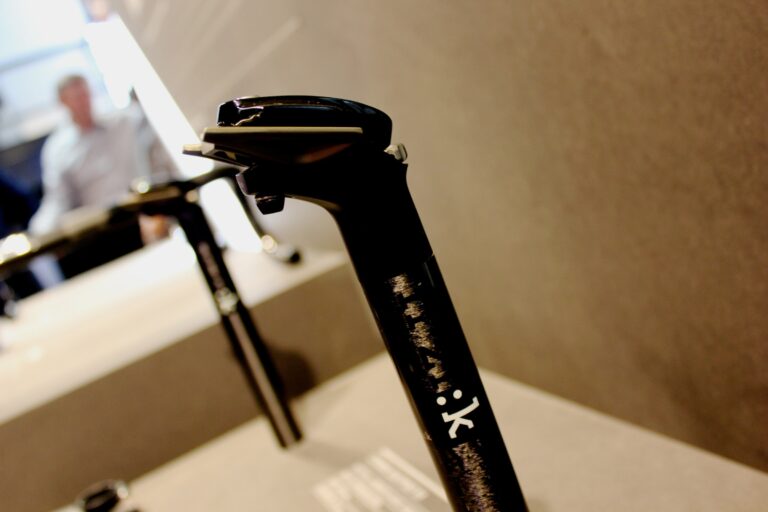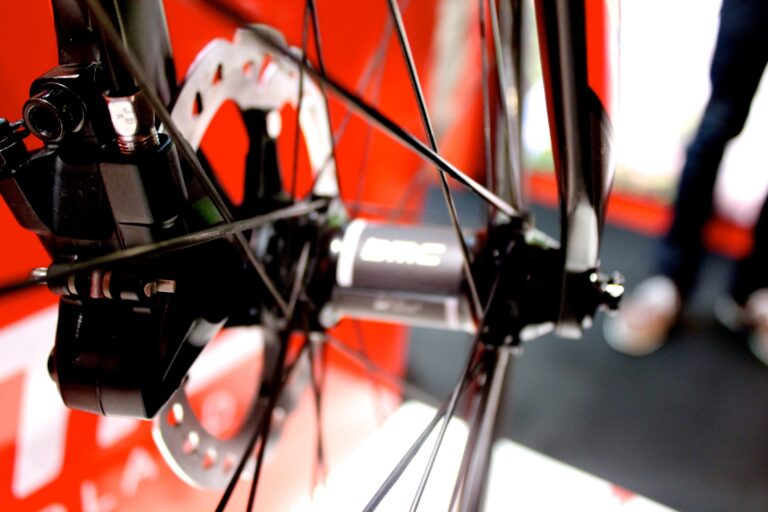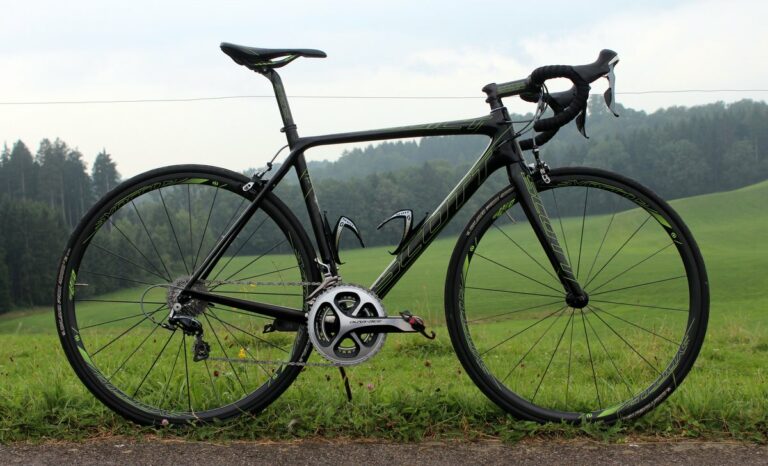Bike fitting systems have become increasingly popular in recent years.
Several different methods exist, from the humble plumb line to sophisticated motion capture systems with accompanying software to measure the rider’s performance in varying positions.
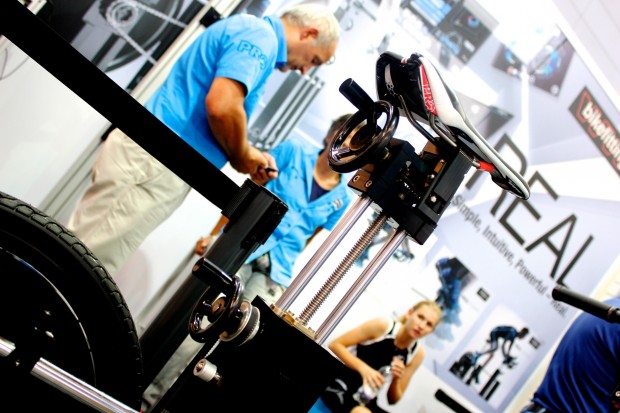
Shimano is set to enter the fitting arena, adding recommendations for equipment from a host of brands, and from frames to shoes, to software algorithms that measure performance and position.
Having acquired bikefitting.com and developed a system with its founders (all three of whom were present on Shimano’s stand at Eurobike), the Japanese giant has entered the fitting arena with an a system priced aggressively at between €6,000 and €7,000, which they intend for Independent Bike Dealers (IBDs), or local bike shops.
So will 3D motion capture analysis be on the menu the next time you call in for an inner tube? And if so, what benefits might it bring you?
Let’s take a closer look.
Jig-saw: measurement tools and GUIs
The “entry point” to the system is the static measurement jig, a simple frame capable of recording basic measurements, including height, shoulder width, and the length of arm, foot and inseam, among others. So far, so simple.
More impressive is the accompanying software package, whose algorithms can generate a series of recommendations for frame geometry, including from specific manufacturers. The system is billed as “brand neutral” and the software’s algorithms can generate recommendations for bikes and frames from a host of different manufacturers.
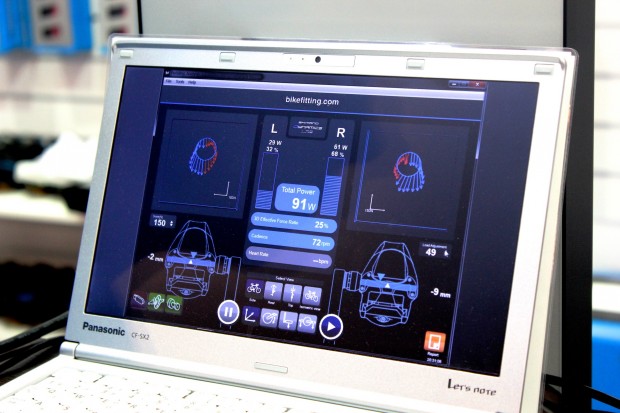
The fitting bike, however, what might be considered a dynamic jig, in which almost every parameter can be adjusted in response to the output of algorithms measuring the riders’ position, is the heart of the system. Crank length and “wheel base” are among the variables that can be fine tuned.
The adjustable saddle clamp, one with a quick release mechanism that allows saddles to be changed swiftly, offers fine adjustment on saddle angle “to deliver the last percentage of fit and comfort performance.”
The fitting bike is also capable of sophisticated measurements of performance data, such as left-right power outputs, thanks to a ‘pedaling analyzer’ or force crank, whose outputs are displayed in graphical form, and in real time.
Feel the force
The force crank offers a broad range of measurements, including left and right power outputs, effective force ratio, pedal stability, and tangential and radial forces on the crank. It measures power through an encoder, capturing increments of the pedal stroke, unlike some other systems, which measure fluctuations in torque over a set period.
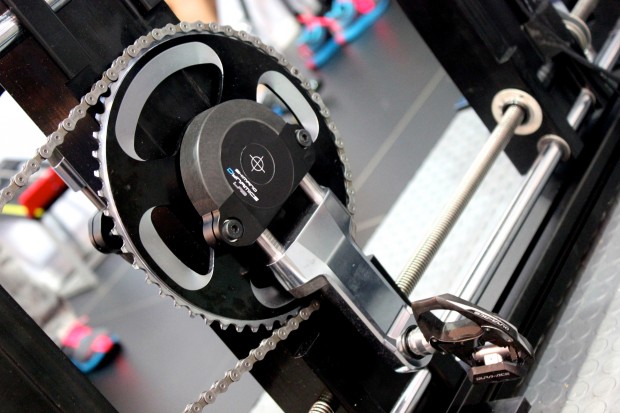
Shimano’s fitters have been using the force crank with all of its WorldTour teams for the last two years (Argos-Shimano, Orica-GreenEDGE, et al). The benefits of a perfect fit to the elite athlete are significant: one fitter who works closely with Shimano’s WorldTour teams told RoadCyclingUK a rider had achieved a 13.5 per cent gain in pedalling efficiency at 400 watts following analysis of cleat position, shoe, insole, and saddle height and shape.
Feel the motion
Motion capture systems – in essence, those where the rider’s position is filmed and analysed – represents the forefront of bike fitting. It has become the calling card of the Retul system acquired by Specialized, and, alongside the static jig and fitting bike, represents the third spoke in the wheel of Shimano’s system with bikefitting.com.
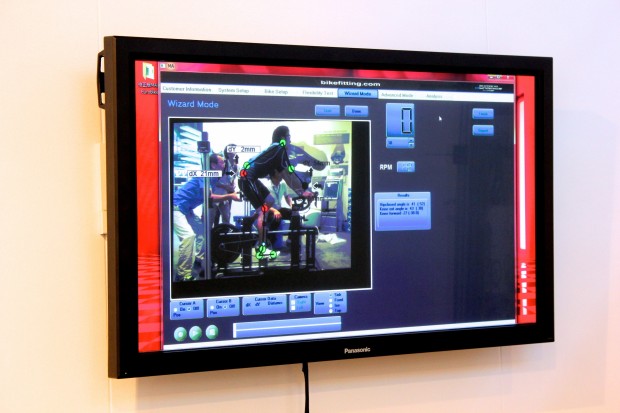
Nine sensors are attached to the rider, capturing angles of shoulders, hips, knees, heels, and ankles, among others. Depending on camera position, the rider’s movement can be viewed and analysed from the top, side, or front.
Needs must?
Is such detailed analysis necessary for the weekend rider? Shimano, unsurprisingly, say yes. Not only is the fitting system a tool for improving performance, they claim, but also one for “minimizing losses” – correcting foot problems, for example, or identifying them before they occur. The fitting bike and its sophisticated force crank has been used to develop the brand’s latest shoe collection, new pedals with an additional 4mm on the Q-factor, and new cleat spacers and shims to address “asymmetry issues” in the pedal stroke (favouring one leg over the other).
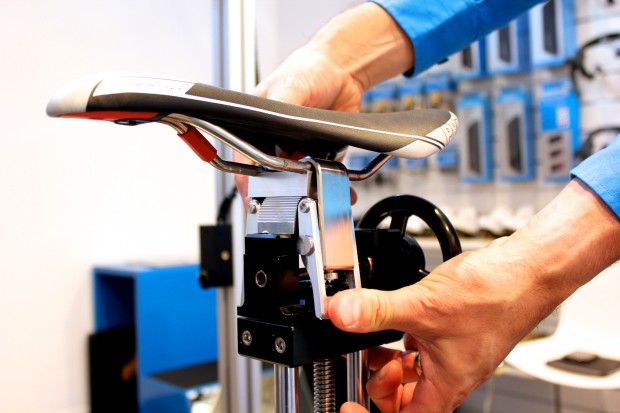
This isn’t to say that the force crank’s algorithms produce an unswerving recommendation for Shimano’s own products. “Plug-ins” to the software include sole depth, to choose just one example, of a host of shoe brands, and is included in the formula from a static measurement to calculate an initial seat height. Shimano is “fine tuning” a more sophisticated algorithm to “normalize” the effect of different saddle lengths, and, more importantly, the concomitant variations in the centre point of each.
While there are obvious disadvantages to recommending competitors for a company that makes so many products affected by a fitting programme, Shimano claim that being “brand neutral” will help their intended customer for the bike fitting system – the humble bike shop, or, Independent Bike Dealer (IBD) in the jargon.
Making IBD’s ‘fit’ for purpose?
Shimano make no bones about the primary function of their bike fitting system: to help the IBD sell more peripheral product, whether that be shoes, handlebars, stems, or saddles.
They pitch the system as a powerful weapon for bricks and mortar retailers competing against the online giants. “We basically try and help the shop be relevant for the future,” Shimano’s man on the stand at Eurobike told RCUK.

Claims for simplicity lie at the heart of the offering. Shimano say it “demystifies” bike fitting, and reduces the time required to produce an accurate fit to about 90 minutes, with tools that include a software ‘wizard’ that promotes a step-by-step approach.
The system will represent a significant investment for most local bike shops, but with sales hit by internet pricing, increasing numbers of dealers are seeking to offer services that online retailers can’t. Whether those services will include Shimano’s bike fitting system remains to be seen, but given the scale of the brand, there’s perhaps a greater than outside chance that fitting technologies previously available only to pro cyclists will be coming to a bike shop near you.
Website: bikefitting.com

